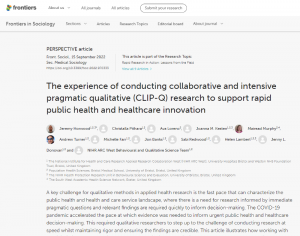Conducting rapid qualitative research: the CLIP-Q approach
21 September 2022
ARC West researchers have published CLIP-Q, their approach to conducting rapid qualitative research developed during the pandemic, in the journal Frontiers in Sociology. Qualitative research involves things like interviews and focus groups.
CLIP-Q stands for ‘conducting collaborative and intensive pragmatic qualitative research’. The approach aims to support rapid public health and healthcare innovation.
Producing rapid findings to inform decision-making has been a key challenge for qualitative methods used in applied health research. This was particularly the case during the COVID-19 pandemic, when evidence was needed to inform urgent public health and healthcare decision-making. Qualitative researchers had to step up to the challenge of conducting research at speed whilst maintaining rigour and ensuring credibility of findings.
ARC West’s Behavioural and Qualitative Science Team’s CLIP-Q approach involves:
- Collaboration at all stages of projects, including their design, conduct and implementation. Where possible, co-produce projects with people with lived experience. Meaningful collaboration enables the diverse users of findings to be active agents with equal standing to the researchers.
- An intensive, team-based approach to data collection and analysis to produce timely and relevant findings. Having more than one researcher working on the same study allows for faster data collection and analysis. It also enables peer quality control and exchange of expertise. Collaborative team-based working can improve analytic rigour when working at speed, with the process of examining data from multiple perspectives and assisting collective data interpretation.
- Pragmatic study design and efficient strategies at each stage of the research process. This requires working with collaborators to focus on key research questions, using flexible designs that can accommodate shifting needs and priorities and timely sharing of findings.
- A two-stage dissemination approach allows for both practical and academic interests to be met. First the needs of stakeholders and end users are met, through concentrating analysis on critical issues, writing rapid reports and disseminating the work to relevant audiences. Then more in-depth analysis can take place, guiding later academic publications.
Professor Jeremy Horwood, NIHR ARC West, a lead author, said:
“Following the pandemic, qualitative applied health research is now happening at a faster pace than traditional academic research.
“There is also a move to embrace research collaboration and knowledge co-production by researchers working alongside stakeholders and service users. This creates findings that are rapid, responsive and relevant.
“CLIP-Q uses a collaborative and intensive pragmatic team-based approach. This focuses research questions and guides strategies, enabling efficient design and expedited data collection, analysis and dissemination of urgent evidence to stakeholders as well as academic publications.”
Paper
